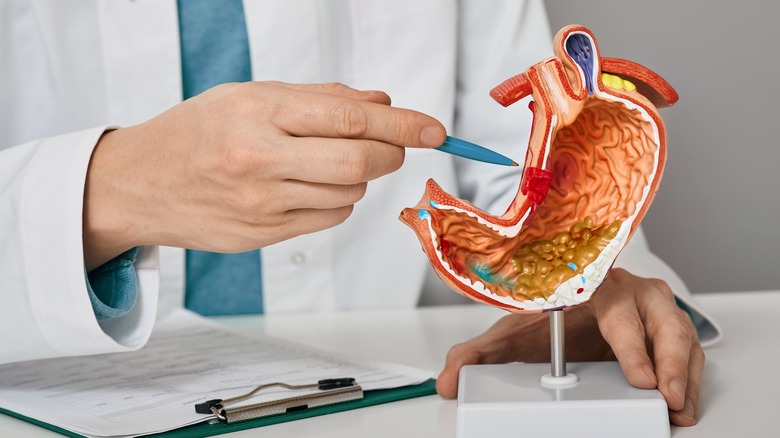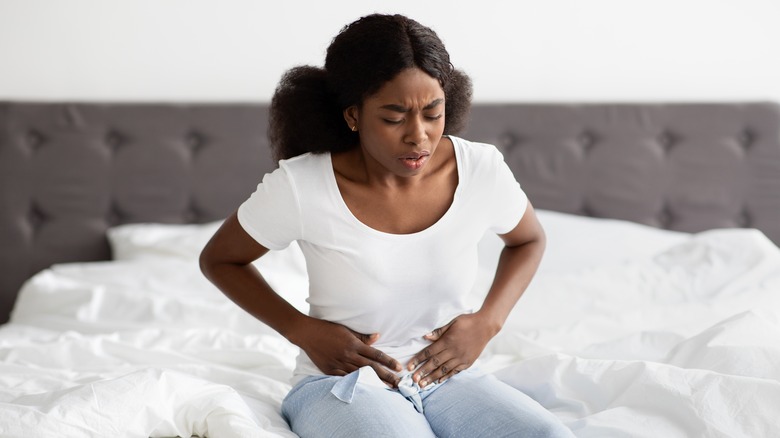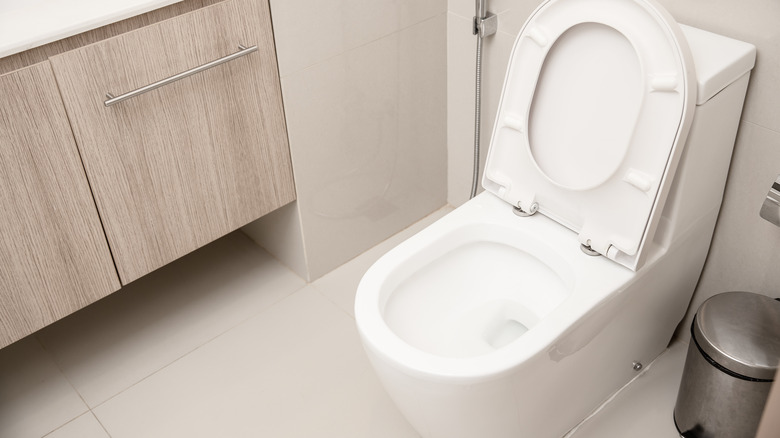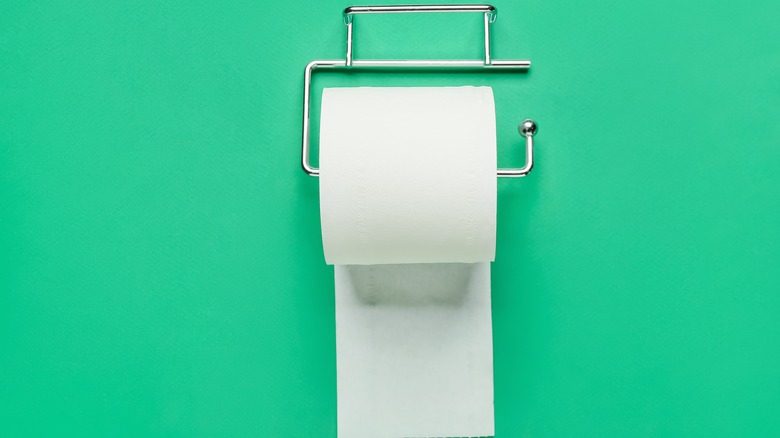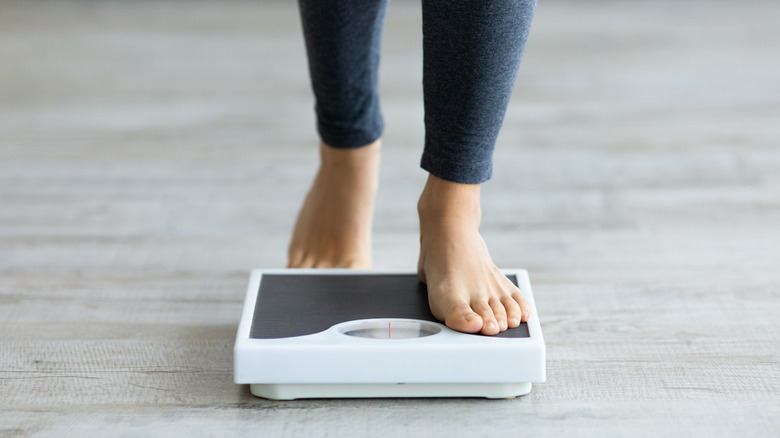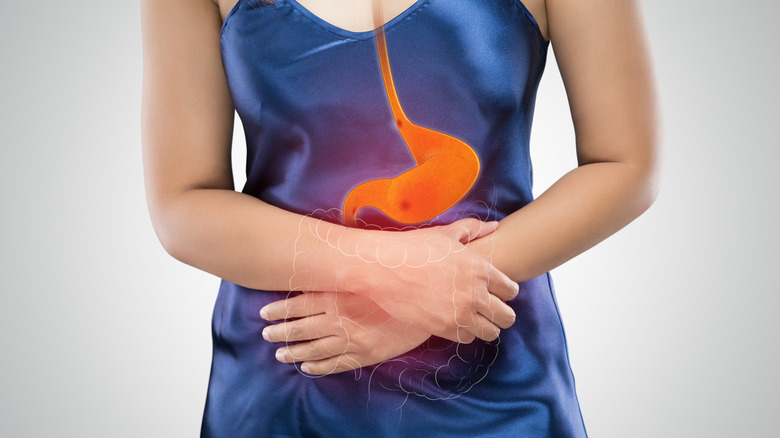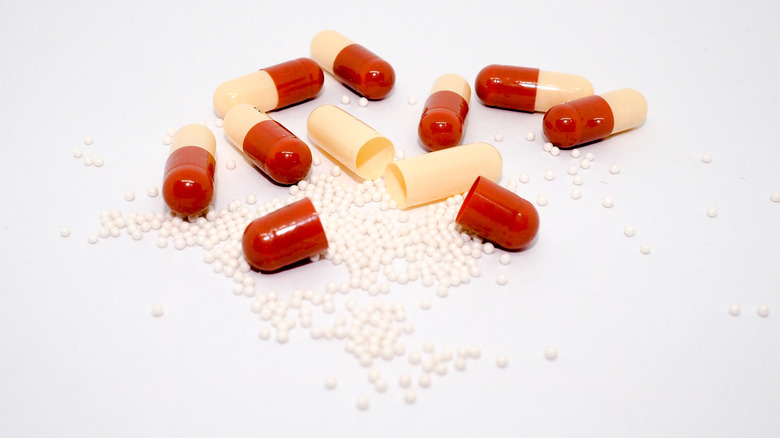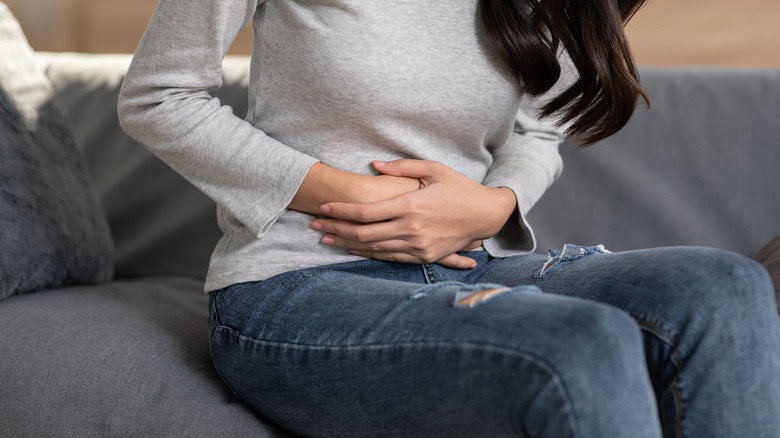11 Signs Of An Ulcer You Should Never Ignore
Of all the conditions out there that can affect your stomach, an ulcer has to be up there with the most irritating, as well as the most common. Every year, over 4 million Americans experience a peptic ulcer (with around 10% of all people having one throughout their lives), with duodenal and stomach ulcers commonly causing pain and discomfort (per Harvard Health Publishing). And once you have an ulcer, they're pretty difficult to ignore, with symptoms often only completely abating with medication and advice from your doctor.
But here's the thing: How do you know you have an ulcer in the first place? One of the most confusing things about duodenal and stomach ulcers is how similar their symptoms are to a range of other conditions and causes, and it's easy to write off things like heartburn or that sense of fullness as something that you ate. That's why we decided to put together a list of signs that might indicate you have an ulcer, from the common to the more surprising, so you can make sure you spot it early.
Why do ulcers happen in the first place?
Our stomachs are well-equipped to deal with the food and drink we throw at them every day, but now and again, things can get on top of them a little — and that's when an ulcer can start to form. Ulcers are generally not caused by food, however, but by a few specific factors that can damage the coating in our stomach, leaving the lining more vulnerable (per the National Institute of Diabetes and Digestive and Kidney Diseases). One of the more common causes is the frequent use of NSAIDs like ibuprofen or aspirin, which in trying to combat inflammation and pain can also make your stomach more vulnerable to damage, including ulcers. Infection by the bacteria H. pylori can also result in an ulcer forming, as the bacteria and your stomach acid coalesce to work through your stomach lining and irritate the flesh.
Another cause is Zollinger-Ellison syndrome, which causes tumor growth in your gastric system, although this is relatively uncommon. Ulcers may also, in some cases, be caused by higher levels of stress, and stress may also worsen already-formed ulcers, says Medical News Today.
Stomach pain is one of the most frequent symptoms of an ulcer
Given that gastric ulcers are defined as sores in your stomach lining, it makes sense that your stomach might be a little "sore" (see what we did there?) due to this condition. And in fact, pain in the stomach area is one of the first things you should be looking out for if you suspect an ulcer, says Healthline. Caused by the contact your stomach acid makes with your ulcer sores, this pain will generally feel like a burning sensation, and will usually manifest in the middle of your torso and stomach area, somewhere between your navel and chest. You may also notice that the pain is worse before you've eaten anything, or if you haven't eaten in a long time.
The length of the pain can vary, as can the severity of it. Sometimes pain due to an ulcer will only last for several minutes, whereas other times it'll go on for a while. The pain can also get less intense at different points of the day and feel more like a dull ache. So, if you're feeling an ache in your belly, it's best to contact your doctor as soon as possible.
You could experience heartburn
Heartburn is a seriously common condition, affecting over 60 million people in the U.S. monthly (per MedlinePlus Magazine). And while the cause of heartburn can vary considerably, with anything from being pregnant to eating onions prompting your stomach acid to move back into your esophagus (per the Mayo Clinic), it's important to be aware that it could be a sign of an ulcer. Having a stomach ulcer can affect your digestion and the levels of stomach acid you produce, which can therefore result in the acid moving into your upper digestive system, causing discomfort (per Middlesex Digestive Health & Endoscopy Center).
The production of stomach acid can also create issues when you're trying to recover from an ulcer, as Patient discusses. This is why your doctor may prescribe medication within the proton pump inhibitor (or PPI) family. These medications, which include omeprazole, lansoprazole, and pantoprazole, work to reduce the amount of stomach acid that your stomach lining cells are making, thereby giving your ulcers more space to heal. This will also, as a byproduct, assist in reducing the amount of heartburn you experience when you have an ulcer.
Vomiting can be a symptom of an ulcer
Nausea and vomiting are symptoms of an almost mind-bogglingly long list of conditions, from stress to a heart attack, to appendicitis, to regular old food poisoning (per WebMD). And as it turns out, you can add ulcers to that list, too. Peptic ulcers cause vomiting primarily through obstructing food, according to the Mayo Clinic. When you have an ulcer, the food you eat can have a harder time moving through your digestive system, and so you become full quicker. This then causes food to move back up through your system and be regurgitated.
It's worth bearing in mind that vomiting, as a symptom, is a sign of an ulcer of some severity, and so if you are vomiting it's important to speak to a healthcare provider immediately. It's also important to keep an eye on the color of your vomit. If your regurgitation is especially dark or has red in it, it's a sign of blood, which may indicate internal bleeding. Should this be the case, contact your doctor as soon as possible.
You might find yourself intolerant of certain foods
Are you a fan of a juicy burger? What about a nice, cold, refreshing glass of milk? If you are, you might find that they're going down a little less smoothly if you have a stomach ulcer. Certain foods and drinks can create an issue for folks with stomach ulcers, due to their aggravation of the condition and the potential to worsen symptoms and prolong healing time (per WebMD). And some of these are more innocuous than you think. Drinking milk, for example, used to be something that people considered a remedy for ulcers, but it's now recommended that you avoid doing so, thanks to milk's propensity to increase stomach acid production.
You might also find that eating fried or fatty foods might not be as enjoyable as it used to be. Foods that are higher in fat are harder to digest, which leads to the food sitting in your stomach for longer, potentially making your ulcer symptoms more severe. It might be a good idea to lay off the booze while you have an ulcer, too. Drinking alcohol is pretty hard on your digestive system, and the irritation it causes might cause your ulcers to flare up.
If you notice blood when you go to the bathroom, it could be a sign of an ulcer
How often do you check your poop? If you don't do it at all, it might be time to start. Inspecting our stools can give us a crucial window into our health, with our poop's shape and color telling us everything from whether we need more electrolytes to whether we could do with eating more fiber (per Healthline).
And stool color can also be a clear indicator of whether you have an ulcer. Noticing blood in your poop, especially when it's accompanied by pain in your upper abdomen, can be a key sign of a stomach ulcer, according to University of Chicago gastroenterology specialist Neil Sengupta via Reader's Digest Canada. When this is the case, your doctor may suggest that you have an upper endoscopy exam to check whether ulcers have formed in your digestive tract. It's important to remember that your blood may not appear red in your stools, as when blood is digested it turns black, so watch out for especially dark poop as well (per Prima Medicine). Bear in mind that blood in your stool may also be a sign of a range of other conditions, but it's usually always something to get checked out (via WebMD).
Bloating is a sign of ulcers
Have you been feeling a little more full than you normally do recently? A little gassier, perhaps? That bloating you're feeling could be due to an ulcer, according to Cedars Sinai. Bloating can often be caused by a blockage in your digestive tract, usually near your stomach's outlet, thanks to the activity that occurs when you have an ulcer. The inflamed tissue, potential scarring, and muscle constrictions near this opening can close things off, resulting in a feeling of bloating after you eat.
The closure of the stomach's outlet can also cause some other symptoms, like continuous vomiting or a decreased desire to eat. If you're experiencing these signs, your doctor might advise you to have a gastroscopy to check whether the outlet is obstructed (per the National Health Service). Your treatment will then depend on the reason there's an obstruction in the first place. If it's due to scarring, you may have to have some of the tissue surgically removed to widen the outlet. If inflammation is the cause, medication may be prescribed to bring it down, usually by reducing the levels of stomach acid in your system so that the area becomes less aggravated.
You might find that you're losing your appetite quicker
If you normally have a healthy appetite but are finding recently that it's a little harder to finish your meal, it could be a sign of a stomach ulcer. A reduced appetite, as well as unexpected weight loss, are symptoms of a peptic ulcer, as the Mayo Clinic discusses. This is often due to an obstruction in the stomach that prevents food from traveling down your digestive tract as it normally should. This can mean that you get fuller faster than would usually occur.
It's also useful to bear in mind that when you have a stomach ulcer, certain foods may be easier and more beneficial to eat than others, especially if your ulcer is a result of the H. pylori bacteria. Specific plant-based foods are especially useful thanks to their ability to potentially help fight H. pylori, with cabbage, radishes, berries, and carrots all providing a gut-healthy bite. Consuming foods rich in probiotics, like yogurt, sauerkraut, and kombucha, may also be friendly to your peptic ulcers, and assist in the healing process.
Pain in your back can be a symptom of ulcers
When you have a stomach ulcer, it makes sense to assume that the pain would manifest in ... your stomach, right? Well, while pain in your upper abdomen is one of the telltale signs of an ulcer, you can also experience pain in other parts of your body when you have one, including in your back. "If the ulcer has penetrated through the bowel wall, the pain can become more intense, longer in duration, and harder to alleviate," states New York-Presbyterian and Columbia University Medical Center gastroenterologist Shipla Ravella to Women's Health Magazine.
It's also important to note that sometimes pain from an ulcer can be referred, and you might also feel the ache in other parts of your torso, like your chest. A case study published in General Medicine details this, noting a rather unusual occurrence of referred pain to the left-hand side of the chest in a 51-year-old patient.
Watch out for unexpected weight loss
Having a stomach ulcer can be a seriously unpleasant situation, and you may start to notice changes in your body when you experience one. One key change is unexpected weight loss, according to Prima Medicine. This can happen because when you have a stomach ulcer, it causes your stomach to inflame, potentially obstructing the path by which food moves through your digestive system. As a result, you're able to eat less food, and you may therefore lose weight.
But if you're finding that it's harder to eat, and this is causing weight loss, there could be one solution: Favor a liquid diet. A study published in The Japanese Journal of Pharmacology took a look at the effects of a liquid diet on rats that had stomach ulcers. The study found that, in contrast with eating solid food, consuming a liquid diet for ten days "significantly accelerated ulcer healing in both the early and late phases." This could suggest that following a diet lower in solid food could hasten the recovery of your ulcer and help you digest more food easily, although it should be noted that this was an animal study, so further research is likely necessary.
Duodenal ulcers may present different symptoms than stomach ulcers
Did you know that there's more than one type of ulcer? It all depends on where it develops. Generally, peptic ulcers will develop in one of two places in your digestive system: on the inside of your stomach (known as a gastric ulcer), or in your small intestine's upper section (known as a duodenal ulcer), says the Mayo Clinic.
It's useful to note that if you have a duodenal ulcer, your symptoms will likely be different than if your ulcer is gastric. Whereas with a gastric ulcer the pain will generally be fairly erratic and changeable depending on whether you've eaten or not, duodenal ulcers will present with regular pain, says Cedars Sinai. In some individuals, the pain might be relieved when you eat, but it'll generally come back after a few hours, once your food has been digested. The timing of a duodenal ulcer's pain is also different from that of a gastric ulcer. Pain from a duodenal ulcer will generally appear a few hours after waking up, and may also be more severe at night, causing you to wake up from sleep. Like gastric ulcers, duodenal ulcers are usually caused by H. pylori bacteria, and treatment with antibiotics and proton pump inhibitor medication will clear them up, per Patient.
Having an ulcer may result in symptoms of anemia
While some ulcer symptoms may be milder and more localized to the area they afflict, others can affect your entire body. One of the signs that you could have a stomach ulcer is symptoms of anemia, according to Healthline. This occurs because ulcers can result in sustained bleeding over time in the stomach, which then results in blood, iron, and hemoglobin loss, causing some people to become anemic (per the NHS).
As the symptoms of anemia are wide-ranging, it's useful to be aware of when it could be happening, and whether a stomach ulcer might be the cause. A sense of tiredness and weakness is one of the first signs of anemia, with a pale or yellow coloring to the skin also being a key symptom, says the Mayo Clinic. You may also find that your extremities (i.e. your fingers and toes) are colder than usual, and you may get shortness of breath, headaches, and arrhythmia. It's key to note that anemia isn't only caused by ulcers, and there's a huge range of reasons why you might experience the condition, from your diet to your family history.
Treating stomach ulcers in the right way is crucial
If you have a stomach ulcer, it's vital to tend to it as soon as possible. If left untreated, it can lead to a huge array of complications including internal bleeding, obstruction of your food passing through your system, and perforation, according to NHS Inform. The problem is, though, that stomach ulcers can be caused by a few different things, and so treating them properly will help you make sure you're tackling them as efficiently as possible.
If your ulcer is a result of taking ibuprofen or another NSAID medication regularly, then you might be advised to stop using it, or to switch to a different painkiller, says Medical News Today. Ulcers caused by H. pylori are handled a little differently. Your doctor, once they've determined that your ulcer is due to H. pylori, will prescribe you a course of medication to eradicate the bacteria. Simultaneously, they may also put you on a course of medicine that helps reduce the stomach acid in your system, so that your ulcer sores can heal.
If you have a perforated ulcer, it's important to act immediately
Generally, ulcers will stay contained in your stomach or small intestine and can be cured or treated without too much trouble. Sometimes, though, when they're untreated, they can start to get a little deeper, and in certain cases they may work their way through the entirety of your stomach lining, perforating it (per Fairview). And if you have a perforated ulcer, things can get very serious very quickly, and might result in severe symptoms like vomiting and severe pain that can spread up to your shoulder.
Some treatments for a perforated ulcer may be similar to the way you'd treat a regular one, via medication that minimizes your stomach acid. In other cases, it's important to treat them more robustly. Surgery may be required, and a procedure called an Omental patch may be performed, where flesh is placed over the ulcer to cover it and stimulate the healing process (per MedicineNet). This procedure may take several days to recover from in the hospital, and might take a total of six weeks to bounce back from fully.

